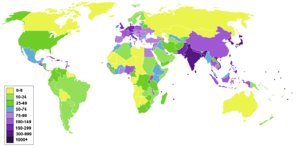Human geography: Difference between revisions
imported>Subpagination Bot m (Add {{subpages}} and remove any categories (details)) |
imported>Subpagination Bot m (Dummy edit to set from-wikipedia flag that I accidentally cleared) |
||
| Line 1: | Line 1: | ||
{{subpages}} | {{subpages}} | ||
[[Image:World population density map.PNG|300px|thumb|Population density by country, [[2006]]]] | [[Image:World population density map.PNG|300px|thumb|Population density by country, [[2006]]]] | ||
Revision as of 13:06, 5 November 2007
- The content on this page originated on Wikipedia and is yet to be significantly improved. Contributors are invited to replace and add material to make this an original article.

Human geography is a branch of geography that focuses on the systematic study of patterns and processes that shape human interaction with the environment, with particular reference to the causes and consequences of the spatial distribution of human activity on the Earth's surface.
Scope
It encompasses human, political, cultural, social, and economic aspects of the social sciences. While the major focus of human geography is not the physical landscape of the Earth (see physical geography) it is hardly possible to discuss human geography without referring to the physical landscape on which human activities are being played out, and environmental geography is emerging as an important link between the two. Human geography is methodologically diverse using both qualitative methods and quantitative methods, including case studies, survey research, statistical analysis, and model building among others.
Disciplines of human geography
External links
- Geo-information's human geography portal
- CommonCensus Map Project - Drawing a human-geographic map of the United States based on votes from its website
References
- de Blij, H.J.; Alexander B. Murphy (2000). Culture, Society, and Space, 7th edition. John Wiley & Sons. ISBN 0-471-44107-4.